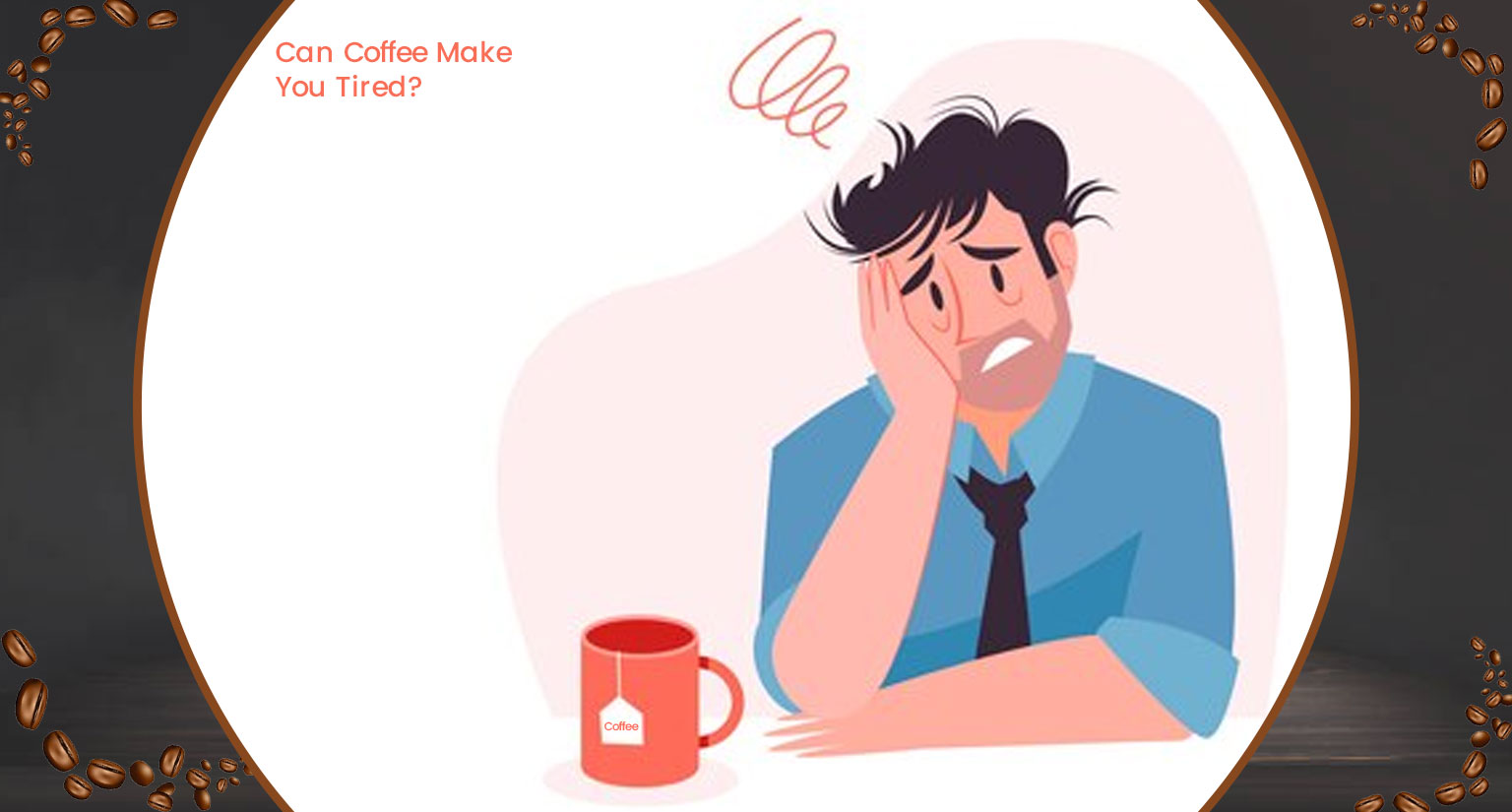Can Coffee Make You Tired?
Coffee, the beloved elixir of countless Americans, is celebrated for its ability to provide that much-needed energy boost to kickstart the day.
But have you ever wondered if your trusty cup of joe could paradoxically lead to fatigue? We’ll delve into the science and common factors behind the question, Can coffee make you tired? So, let’s uncover the truth behind the brew and how it might affect your energy levels.
Why Do I Get Tired After Drinking Coffee?
It’s not uncommon to experience fatigue after indulging in your favorite coffee. There are several key reasons why coffee might make you feel tired instead of energized:
Caffeine Crash
Caffeine, the active ingredient in coffee, has a stimulating effect that can boost your alertness and energy. However, this boost is often followed by a “crash” as the caffeine’s effects wear off. This crash can leave you feeling more tired than you were before you had your coffee.
Overstimulation
Excessive caffeine consumption can lead to overstimulation, which can manifest as restlessness, anxiety, and even palpitations. As your body tries to cope with this overstimulation, it may lead to fatigue once the effects wear off.
Disrupted Sleep Patterns
Consuming coffee, particularly in the afternoon or evening, can interfere with your sleep patterns. Coffee’s stimulating effects can make it difficult to fall asleep and stay asleep, resulting in inadequate rest and a sense of tiredness the next day.
Dehydration
Coffee is a diuretic, meaning it increases urine production. This can lead to dehydration, which is a common cause of fatigue. Staying hydrated is crucial to mitigate this effect.
Everyone’s tolerance to caffeine varies. Some individuals are more sensitive to its effects and may experience fatigue after consuming even small amounts of coffee.
Can Coffee Make You Tired?
As someone who’s had a love affair with coffee for years, I’ve often found myself pondering this paradoxical question:
Can coffee actually make you tired? It’s a conundrum I’ve personally grappled with, and I’m sure many of you have, too. Let me share my insights and experiences.
Energy Boost and the Crash
For me, coffee has always been that faithful companion, there to rescue me from the depths of morning grogginess. It’s like a shot of vitality, a promise of alertness that few other things can deliver.
But here’s the catch – that immediate burst of energy is often followed by a seemingly inevitable crash. That slump where I feel even more tired than before my coffee fix. But why does this happen?
Caffeine Conundrum
The culprit behind this conundrum is caffeine, the magic ingredient in coffee. It’s a stimulant that stimulates the central nervous system and temporarily increases alertness and energy.
However, after that initial buzz, as the caffeine’s effects start to fade, I’ve noticed a significant dip in my energy levels. This can feel like fatigue, leading to that nagging question – can coffee make me tired?
Role of Timing
I’ve discovered that the timing of my coffee consumption plays a crucial role in determining whether it will leave me energized or exhausted.
Having my coffee in the morning, when my cortisol levels are naturally higher, seems to provide the best results. It gives me that wake-up jolt without the subsequent energy crash.
Hydration Matters
Staying hydrated is another lesson I’ve learned. Coffee is a diuretic, which means it can lead to dehydration. I’ve found that pairing my coffee with a glass of water helps mitigate this effect and keeps me feeling more alert.
Sensitivity
Through my personal journey, I’ve also come to understand that everyone’s sensitivity to caffeine is different. Some people can handle more caffeine without feeling tired, while others, like me, might need to be more cautious with their intake.
Can coffee make you tired? The answer is a nuanced one. It depends on various factors, from your personal sensitivity to caffeine to the timing of your coffee consumption.
How to Maximize the Benefits of Coffee?
Timing is everything when it comes to coffee. To harness the benefits without risking sleep disruption, consider your body’s natural circadian rhythm.
In the morning, when cortisol levels are highest, enjoy your coffee to amplify alertness. Avoid caffeine in the late afternoon or evening, as it can interfere with your sleep cycle.
Stay Hydrated
Coffee is a diuretic, which means it can lead to dehydration. Counter this by drinking water alongside your coffee. Staying hydrated ensures that you reap the energizing effects of caffeine without feeling drained or fatigued.
Monitor Your Consumption
Caffeine has its merits, too much can lead to restlessness and subsequent tiredness. Aim for a moderate caffeine intake, usually around 200-400 milligrams a day.
Keep track of your consumption, and you’ll likely experience sustained energy without the dreaded post-coffee crash.
Option for Quality Brew
Choose high-quality coffee beans and brewing methods. Freshly ground beans and precision brewing not only enhance flavor but also the potential for sustainable energy. Low-quality coffee may contain impurities that can contribute to tiredness.
Combine Coffee with Snacks
Pairing your coffee with a healthy snack can help stabilize your blood sugar levels and provide a steadier source of energy.
Option for complex carbohydrates and protein-rich options to maintain your vitality throughout the day.
How Do I Get Rid of Coffee Tiredness?
Post-Coffee Slump Struggle
We’ve all been there – that frustrating moment when your favorite brew, your morning savior, seemingly turns against you.
You had your coffee, felt the initial surge of energy, and then, out of nowhere, the dreaded coffee tiredness kicks in.
I’ve experienced it more times than I’d like to admit. So, what can we do to banish this feeling and make coffee work for us rather than against us?
Stay Active
One of my tried-and-true methods for combating coffee-induced tiredness is to stay active. A brisk walk, a bit of stretching, or a quick workout can help reinvigorate my body and mind. Exercise releases endorphins, which act as natural energy boosters.
Nourish Your Body
After my coffee, I make sure to have a balanced meal or snack. Protein and complex carbohydrates can help stabilize my blood sugar levels, preventing the energy crash that often follows a caffeine rush.
Hydration
Dehydration can exacerbate coffee-related fatigue, so I make it a point to drink plenty of water throughout the day. Staying hydrated helps keep me alert and avoids that drained feeling.
Limit the Afternoon Sip
I’ve learned the hard way that afternoon coffee is a double-edged sword. If I indulge in coffee too late in the day, it can interfere with my sleep at night.
So, I’ve started to limit my caffeine intake to the mornings, and it has made a significant difference in avoiding post-coffee tiredness.
Mindful Sipping
I’ve also become more mindful about my caffeine intake. I’m aware of my sensitivity to it, so I make sure not to overdo it. A moderate amount of coffee seems to provide that boost without the crash.
I’ve discovered that it’s possible to enjoy the perks of coffee without succumbing to the subsequent fatigue.
By being mindful of my body’s needs, staying active, and balancing my caffeine intake, I’ve found a way to make coffee work for me, not against me.
FAQs (Frequently Asked Questions)
Q1: Can coffee actually make me tired?
Yes, it can. While coffee is known for its stimulating effects due to caffeine, it can lead to fatigue once those effects wear off, often referred to as a “caffeine crash.”
Q2: Why is the timing of coffee consumption important?
Timing matters because our body’s natural circadian rhythm can affect how we react to caffeine. Drinking coffee in the morning when cortisol levels are higher can maximize its stimulating effects while minimizing the risk of feeling tired.
Q3: Is coffee the only beverage that can cause tiredness?
No, other caffeinated beverages and stimulants can also lead to tiredness if consumed excessively or at the wrong time. It’s important to be mindful of your overall caffeine intake.
Q4: Are there alternatives to coffee to avoid caffeine-related tiredness?
A6: Yes, alternatives like green tea, herbal infusions, or decaffeinated coffee can provide a smoother and more sustained source of energy without the abrupt ups and downs associated with regular coffee.
Q5: How can I determine my caffeine sensitivity?
Caffeine sensitivity varies from person to person. You can discover your sensitivity by monitoring how your body responds to different caffeine levels and adjusting your intake accordingly.
Q6: Can decaffeinated coffee cause tiredness?
Decaffeinated coffee contains significantly less caffeine, so it is less likely to cause the typical caffeine crash. However, individual reactions may still vary.







